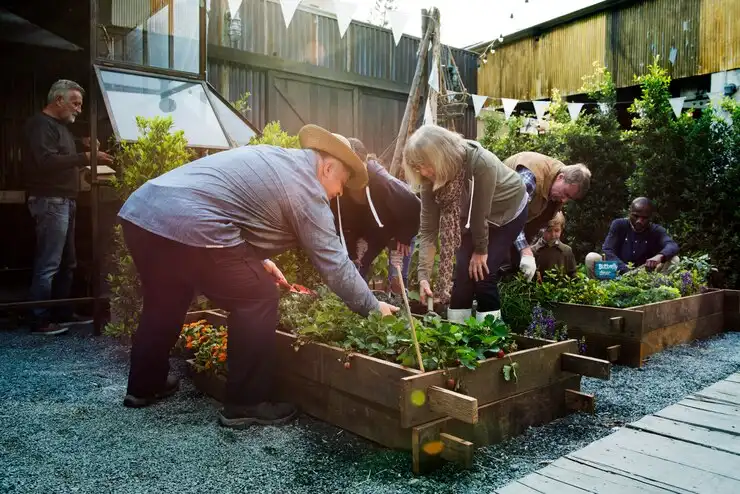
Blog
Urban Gardening The Secret to Creating a Successful Garden in the City

You do not have to give up your passion for gardening because you live in a city. In the center of the city, urban gardening provides a singular chance to cultivate your own food, enhance your environment, and establish a connection with the natural world. Even in the tiniest urban areas, you can establish a flourishing garden with a little imagination and hard work. This is how to maximize your city living and get started with urban gardening..
Evaluate Your Area.
Assess the Space You Have Available
Examine the outside area that you have access to, be it a windowsill, rooftop, balcony, or little backyard. Examine elements such as exposure to sunshine, wind, and water availability to ascertain which plants will do well in your city.
Think about gardening in containers.
Container gardening is a great option for urban areas with little land. Herbs, vegetables, flowers, tiny shrubs, and other plants can all be grown in pots, planters, hanging baskets, and reused containers.
Select the Correct Plants.
Choose Plants That Fit Your Space
Select plants that are appropriate for the particular urban setting you live in. Think about things like sunshine availability, temperature swings, and available space. Select dwarf cultivars or compact variants that are ideal for container gardening.
Put Beneficial Crops First
Grow crops with great yields that provide a lot of food in a little space, such as lettuce, tomatoes, peppers, and herbs, to make the most of your available space. These vegetables grow well in urban settings and are ideal for container gardening.
Design a Useful Garden.
Make the Most of Vertical Space
Make the most of the vertical space in your urban garden. Grow plants upward by using trellises, hanging planters, or vertical garden systems to free up valuable floor space for other purposes.
A plan for upkeep and accessibility
When designing a garden, especially in a tiny urban location, consider ease of upkeep and access. Planters and pots should be arranged so that you can easily water, trim, and harvest your plants.
Maintain and Care for Things Properly.
Hydrating
Water your urban garden regularly this is especially important in hot, dry climates where plants can easily dry up. To make sure plants get enough moisture, use a watering can, drip irrigation system, or self watering containers.
The process of fertilization
Fertilize your plants on a regular basis to supply the necessary nutrients for their healthy growth. If you want to nurture your plants without using dangerous chemicals, use compost or organic fertilizers.
Adopt Sustainable Behaviors.
Putting up compost
To create nutrient rich compost for your urban garden, start a composting system and recycle organic waste from your kitchen and yard. In addition to reducing trash transported to landfills, composting enhances soil health.
Water Conservation
 To reduce water wastage in your urban garden, use water conservation strategies like drip irrigation or barrel collection of rainwater. Mulching also lowers evaporation and helps the soil hold onto moisture.
Use Your Creativity to Solve Urban Gardening Problems.
Public Gardens
If you have no room at home for gardening, consider joining a communal garden. Shared gardening space, materials, and socializing opportunities are offered by community gardens to other urban gardeners in your neighborhood.
Unconventional Gardening
Participate in guerilla gardening projects to turn abandoned urban areas into verdant havens. To make the urban landscape more beautiful, plant flowers, vegetables, or trees in public areas like sidewalks, roadside verges, and vacant lots.
Accept the Advantages of Urban Gardening.
Health and Health
There are several health advantages to urban gardening, such as increased physical exercise, less stress, and enhanced mental wellness. Your whole quality of life in the city may be improved by going outside and interacting with nature.
Impact on the Environment
Urban gardening helps to mitigate the impacts of urban heat islands, save water, and reduce food miles all of which contribute to environmental sustainability. In urban settings, it also sustains biodiversity and offers habitat to pollinators and other species.
In summary.
Growing food locally, fostering a connection with the natural world, and enhancing the surroundings are all made possible via the satisfying and fulfilling activity of urban gardening. Even in the tiniest urban areas, you may have a flourishing garden with a little imagination, ingenuity, and preparation. City residents may improve their green thumb and get the advantages of gardening in the city through urban gardening, which provides countless opportunities to produce herbs on a windowsill, veggies on a rooftop, or flowers in a communal garden.
4 Comments
Leave a Reply














Noah
Thanks for the fantastic ideas!
James
Thanks for the great tips overall.
Charles
Keep up the great work!.
Marie Johnson
Thank you for the detailed tutorial and creative ideas!